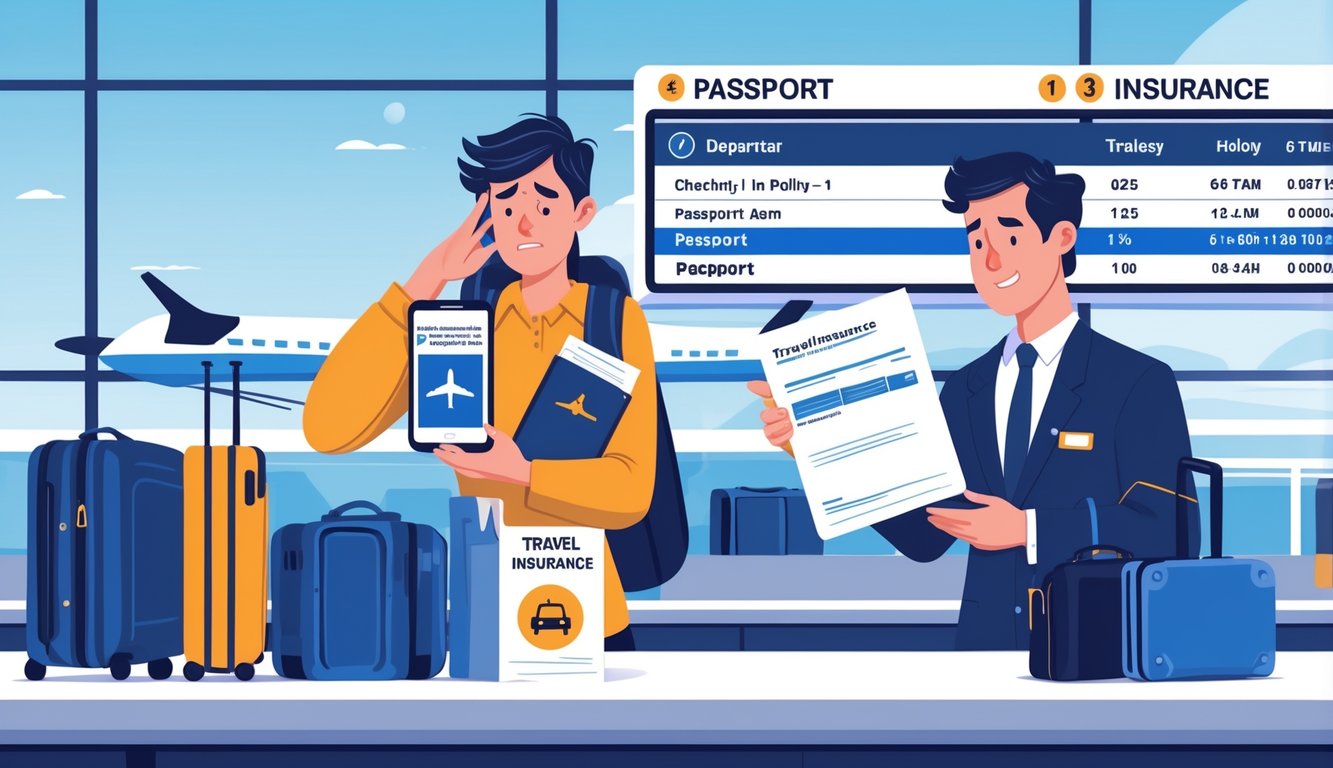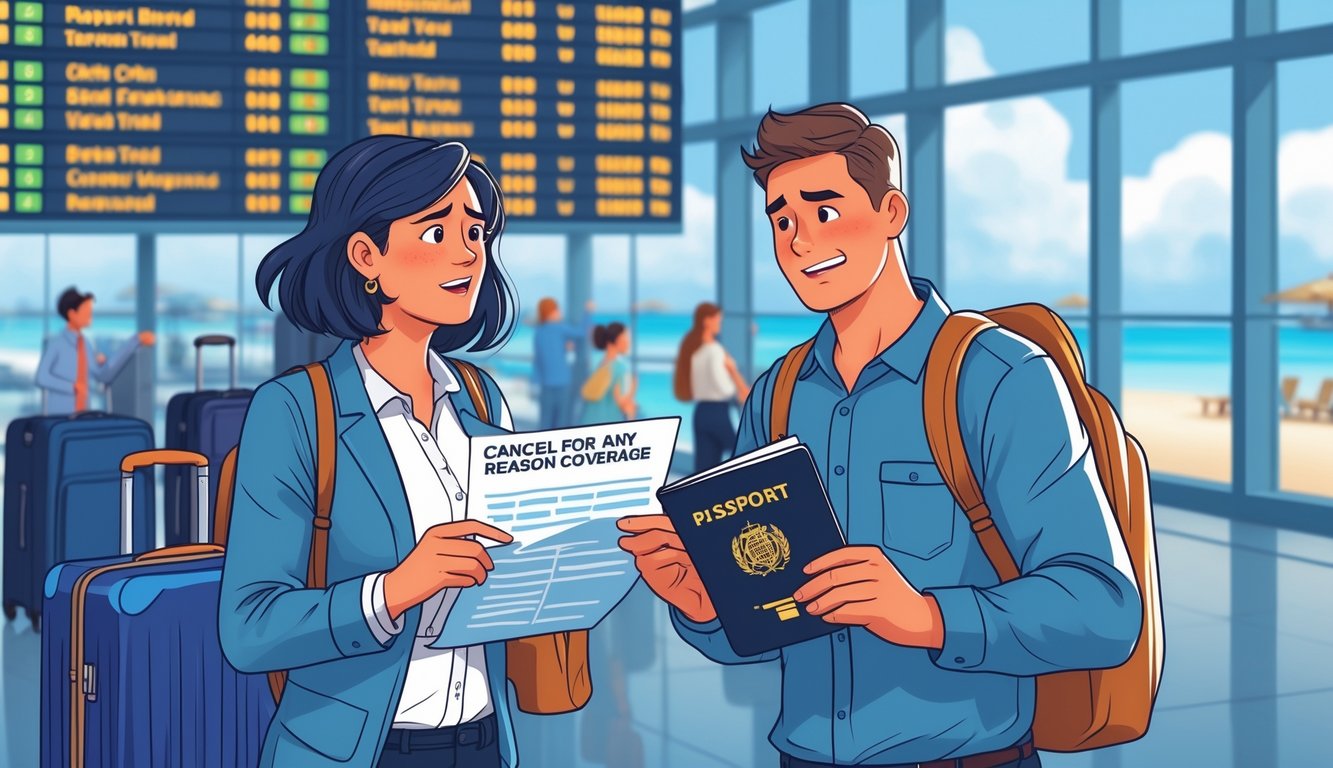
The Risks of Booking Travel Insurance Too Late
It blows my mind how many people think they can just buy travel insurance at the gate, like it’s a coffee or a neck pillow. Miss the window and you’re eating the cost if your plans blow up—family emergency, canceled flight, whatever.
When Is It Too Late to Buy Travel Insurance?
Movies lie—almost nobody will sell you insurance after your trip’s started. I’ve heard travelers swear they could buy last-minute at the gate, but nope. Most policies want you to buy before you even check in or drive off in your rental.
A travel law specialist once told me, “You need coverage before you know about a risk or loss.” Makes sense. Insurers don’t want to get burned by someone buying after a problem pops up, so they cut it off fast. A few, like Battleface, let you buy up to the day before you leave, but never after you’re in the air. Want to double-check? Policy details or LegalClarity have the actual cut-offs.
I met a guy once who tried to buy insurance to Japan during a layover. Denied, even after begging the agent. The rules are strict and honestly, sometimes feel totally random.
Common Mistakes and Their Consequences
People wait, thinking, “I’ll get insurance after my visa clears or if Grandma’s cough gets better.” Terrible idea. Finhy says the earlier you buy, the faster your cancellation protection kicks in. Wait too long, and every random disaster—car crash, sudden illness—slips through a gap you didn’t even see coming.
I’ve watched travelers lose out because they played the “maybe later” game. If something happens before you buy, insurers just shrug and say, “Known event, not covered.” Even tiny mistakes—like thinking you’re covered for weather after a hurricane’s already named—aren’t fixable after the fact. Medical emergencies that start before your policy does? Excluded. Every. Time.
Nobody reads the fine print or checks if the insurer’s deadline is in a different time zone. Out-of-pocket costs pile up fast. I see it all the time, but somehow everyone thinks they’re the exception.
Trip Cancellation and Interruption Coverage
Running out the door, phone on 12%, frantically Googling “travel insurance” at the gate—been there. So many policies, so many definitions, and nobody at the counter can tell me if my week at the lodge is covered if my flight tanks. If I hadn’t remembered some tiny clause I once read, maybe I’d have risked it. Don’t.
Trip Cancellation Benefits
Trip cancellation coverage—yeah, the thing everyone ignores until their trip goes sideways. I used to roll my eyes at all the ads, but honestly, it’s the only reason IcelandAir didn’t just keep my $1,200 when my doctor called me at 4 a.m. and uttered the word “pneumonia.” Airlines? They’ll happily let you cough up a lung in the terminal and still deny a refund.
But here’s the catch: if I just get buyer’s remorse or find a better deal, tough luck. Trip cancellation only kicks in for “covered reasons.” That means real emergencies—like a legit illness with a doctor’s note, a sudden death in the family, layoffs, jury duty. Basically, stuff you can’t fake, unless you’re a sociopath with a forged death certificate (don’t do that, by the way). Allianz literally spells out how “change of heart” isn’t covered. I tried. They laughed. I facepalmed. If you want to see what actually counts, check the trip cancellation benefits list. It’s all disasters and drama.
And don’t try to buy this after you see trouble brewing. They want you to grab the policy before anything even hints at going wrong. Wait until Aunt Linda sniffles? You’re too late.
Trip Interruption Scenarios
Wildest thing: I ended up stranded in Prague. Train canceled, Airbnb host double-booked me, no backup plan. Trip interruption coverage is supposed to get you home if chaos erupts mid-trip—think broken bones, hurricanes, or, I don’t know, government-level emergencies. Not just “my guide ghosted me.” You can sometimes get reimbursed for unused hotels, tours, whatever you missed, but only if you’ve got paperwork and a real, covered reason.
After my second “emergency,” I realized trip interruption sometimes pays out as much as cancellation, but only if you’re genuinely stuck. Like if the government steps in, or your cruise ship sails off without you (yes, this happens). Want to know if your disaster counts? Difference between cancellation and interruption—they lay it all out. If it’s not on their list, arguing does nothing.
Fine print? Of course. There’s always some rule about what’s covered, how fast you have to call, or what receipts they demand. Feeling unsafe? No payout. Unless the city literally evacuates, nobody cares about your vibes.
Non-Refundable Expenses
This is where people torch their money, honestly. Everyone thinks “I’ll just talk my way out of it,” and then they lose hundreds on pre-paid hotels, tours, or those sketchy “promo” flights you find on deal forums. Cancel a room last minute? The front desk will recite the “it’s policy” line like it’s theater.
Travel insurance only refunds these if you tick all their boxes—sudden illness, real emergency, interruption, and you’ve got every receipt, doctor’s note, and email confirmation they want. Don’t book that baller suite unless you’re cool with losing the cash if things go sideways. Travel delay and cancellation insurance sometimes covers an extra night if your flight’s delayed 12+ hours, but you better read every word or you’ll pay out of pocket for that Airbnb and sad room service burger.
My cousin claims you can just “call the airline and beg.” Let me save you the call: if your ticket doesn’t say “refundable,” you’re toast. Policy beats tears every time. List your biggest expenses on your insurance, or just accept you’re tipping the cruise company $2,500 for canceling last minute.
Cancel for Any Reason (CFAR) Coverage Essentials

So, CFAR—cancel for any reason. People keep asking about this after they already feel weird about their trip. Too late! Why does everyone think insurance works like a Netflix subscription you can just add at any time? (Spoiler: it doesn’t.)
How CFAR Works
After a hotel disaster, I wished for a big red “abort” button. CFAR isn’t magic, but it’s close. Unlike regular travel insurance, which only pays if you’re sick or a hurricane hits, CFAR lets you bail for any reason—bad vibes, your friend’s playlist, or just because the trip feels cursed. But, of course, there’s a catch. There’s always a catch.
Usually, you’ll get back 50-75% of your prepaid costs. Not a full refund, not even close, but better than losing it all. I read somewhere (U.S. News, maybe?) that CFAR can jack up your premium by 50%. Forbes says the average is $622 for five trips. You can’t just buy CFAR by itself; it’s always an add-on.
Here’s the kicker: you have to cancel at least 48 hours before your trip. Wait too long? Nothing for you. My agent laughed about all the people who show up the night before, demanding their money back because they changed their mind. Doesn’t work. Even if you’re in the fancy lounge, insurance doesn’t care.
Eligibility and Restrictions
Paperwork is the worst part. You get, what, 14 to 21 days from your first deposit to add CFAR. Miss that window and you’re done. NerdWallet lays it out: “any reason” is real, but don’t expect a full payout.
Some companies only include CFAR in their “deluxe” or “platinum” packages. Try adding it to a bargain plan or right before departure and they’ll just say no. Plus, you have to insure your whole trip—all the nonrefundable expenses—to get the full benefit. My friend tried to just cover the flight, got denied instantly.
Don’t believe anyone who promises “flexibility.” Nobody bends the 48-hour rule, and if you leave out any nonrefundable bookings, expect a partial payout or nothing. Even government warnings won’t sway them. Airlines cancel, countries lock down, penguins parade on the runway—CFAR doesn’t care unless you set it up right at the start.



